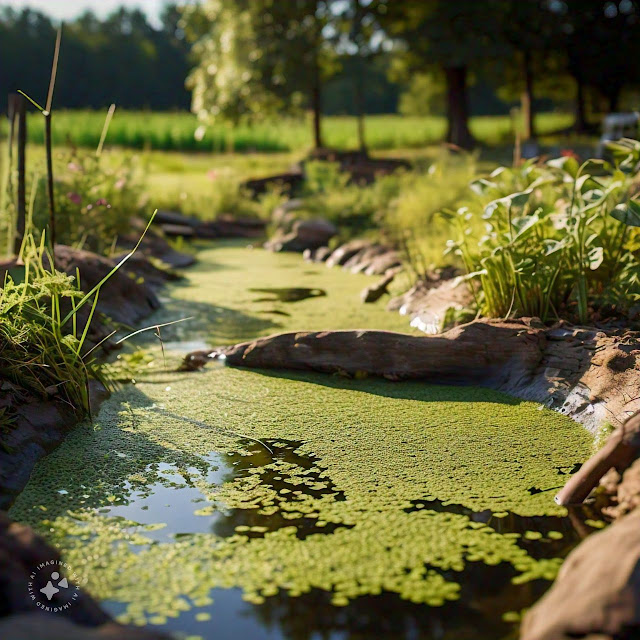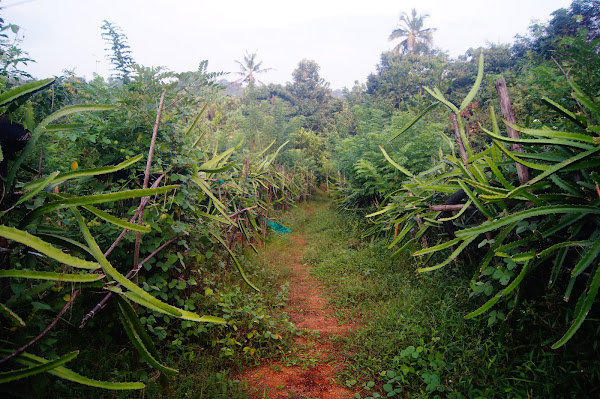The promise of Duckweed in Environmental Restoration
 |
| AI generated images of duckweed |
Duckweed, a tiny aquatic plant, has been increasingly recognized for its exceptional capabilities in removing excess nutrients from wastewater, producing protein-rich biomass, and supporting sustainable agriculture. Integrating duckweed into farm ponds offers an innovative approach to wastewater management, nutrient cycling, and eco-friendly farming practices.
Duckweed's rapid growth rate (doubling biomass in 48-96 hours) and extensive root system enable it to efficiently absorb nutrients, heavy metals, and pollutants from wastewater. By incorporating duckweed into farm ponds, we can remove up to 75% of excess nutrients, reducing eutrophication and water pollution. For instance, a study in China found that duckweed removed 95% of nitrogen and 92% of phosphorus from wastewater in a pig farm. Similarly, another observation in the United States, a dairy farm uses duckweed to treat wastewater, reducing nutrient levels by 70%.
Duckweed's high protein content (up to 40%) and rapid growth make it an excellent source of organic fertilizer. By harvesting and processing duckweed biomass, we can produce a sustainable, nutrient-rich fertilizer for crops. In India, farms uses duckweed fertilizer to improve crop yields, reducing synthetic fertilizer use by 50%. Additionally, duckweed fertilizer has been found to improve soil health and structure, leading to long-term benefits for farmers and the environment.
Duckweed provides shade, reducing algae growth and water temperature. Its extensive root system also helps maintain water clarity and oxygen levels, supporting biodiversity by creating a habitat for aquatic organisms. In a community garden in Brazil, duckweed was utilized to create a sustainable and eco-friendly environment. The garden reported healthier plants, reduced environmental impact, and a significant reduction in synthetic fertilizer use.
Farmers' Instincts and Experience:
Farmers have long recognized the benefits of duckweed, using it as a natural food source for fish and ducks. Duckweed is a preferred food source for many waterfowl, including ducks, providing essential nutrients and proteins. In aquaculture and backyard farming, duckweed is often used as a nutritious feed supplement for ducks.
Implementation and Maintenance:
To fully harness the potential of duckweed in farm ponds, it is essential to consider several factors. Designating a dedicated area for duckweed cultivation, ensuring adequate water depth and retention time (approximately four days), inoculating duckweed into the system, and regularly harvesting and processing duckweed biomass are crucial steps in integrating duckweed into farm ponds.
Incorporating duckweed into farm ponds offers a groundbreaking opportunity for sustainable wastewater treatment, nutrient management, and eco-friendly farming practices. With its ability to remove excess nutrients, produce organic fertilizer, and support biodiversity, duckweed is an invaluable resource for farmers and the environment. We can reduce environmental impacts, promote sustainable agriculture, and unlock the potential of duckweed in farm ponds.
 |
| Real time images of duckweed cultivation in Kerala forest-farm |
Check these amazing facts about duckweed:
- Duckweed is the smallest flowering plant in the world, with some species having leaves as small as 0.1 mm in length.
- Duckweed can grow in wastewater and remove up to 75% of excess nutrients, making it a natural water purifier.
- Duckweed is a superfood for animals, with up to 40% protein content, making it an excellent feed supplement for ducks, fish, and other livestock.
- Duckweed can produce biomass at a rate of up to 50 tons per hectare per year, making it a highly productive crop for biofuel and animal feed.
- Duckweed has been used in traditional medicine for centuries to treat various ailments, including fever, cough, and digestive issues.
- Duckweed can survive in extreme conditions, including high temperatures, salinity, and pH levels, making it a resilient and adaptable plant.
- Duckweed has the potential to sequester carbon dioxide and reduce greenhouse gas emissions, making it a valuable tool in the fight against climate change.
- Duckweed is a natural food source for many aquatic animals, including fish, frogs, and birds, and is an important part of the aquatic food chain.
- Duckweed can be used as a natural fertilizer, improving soil health and structure, and reducing the need for synthetic fertilizers.
- Duckweed has been used in space exploration as a food source for astronauts, due to its high nutritional value and ability to grow in controlled environments.
These are just a few of the many amazing facts about duckweed!







<3
ReplyDelete